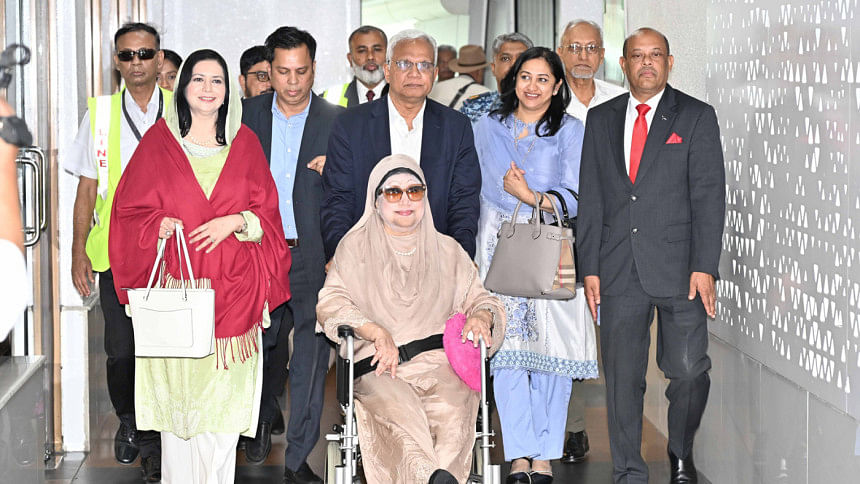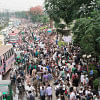What Khaleda Zia’s return means for the BNP

After four months of advanced medical treatment in London, former prime minister and BNP Chairperson Khaleda Zia, one of Bangladesh's most resilient political figures, has returned to Dhaka. Her return is not merely a personal event. It arrives at a turning point in Bangladesh's political evolution, following the 2024 mass uprising and amid the uncertainties of a transitional government.
More significant than her return is the fact that she is recovering. For a woman long portrayed by her rivals as terminally ill and politically irrelevant, her gradual physical revival offers not just hope to her supporters but a quiet rebuttal to the cynicism and cruelty that previously surrounded her treatment. Years of resistance to her medical care abroad, and the mocking public rhetoric that accompanied it, shook the conscience of many.
In the aftermath of the student-led uprising that forced Sheikh Hasina to flee and cleared the way for an interim government led by Prof Muhammad Yunus, Khaleda Zia's reappearance carries symbolic weight. Once placed under house arrest, she now walks into a different political moment—one marked by uncertainty, recalibration, and a chance to redefine democratic participation. Yet, despite all she endured, she has shown no bitterness. She did not attack her political rivals by name. Instead, she called for patience, dialogue, and national unity.
This new role—more reflective than combative—mirrors her evolution from a political warrior to a figure of broader moral authority. While she may not return to the frontline of active politics due to her health, her presence continues to shape the BNP's path forward.
Indeed, the question now looming over the party is that of leadership transition. It is safe to assume that Khaleda Zia and the party's acting chairman, Tarique Rahman, have had substantive discussions about the BNP's future. While Tarique has led the party since 2018, the return of Zubaida Rahman (Tarique's wife) after 18 years in exile introduces a new layer of interest and possibility. Though Zubaida has never been politically active, her presence is bound to draw attention from party members and observers alike. What shape the BNP will take in the coming days, and how its leadership will evolve, may soon become clearer.
The broader political climate remains fragile. The interim government has yet to offer clarity on electoral reforms or a transition timeline, all of which continue to fuel public unease and scepticism. Questions abound about whether the current administration can genuinely facilitate a free and fair electoral process, or whether it risks drifting into another prolonged unelected arrangement.
At the same time, the BNP faces its own internal challenges. While the party remains a principal political force, years of suppression, organisational stagnation, and leadership in exile have left it fragmented at the grassroots. In recent months, troubling reports have surfaced of some local leaders and activists engaging in extortion, intimidation, and factional clashes. Intra-party feuds—often driven by rivalry for influence, financial control, or access to leadership—have damaged the BNP's credibility in several districts. Without strong internal discipline and renewed commitment to reform, the party risks squandering the public goodwill that Khaleda Zia's return and symbolic stature have helped rekindle.
And yet, through all of this, Khaleda Zia stands as a reminder of resilience in the face of repression. Her political journey, beginning reluctantly after the assassination of her husband, President Ziaur Rahman, has spanned coups, jail terms, boycotts, and ballot box triumphs. She led mass movements against dictatorship, served as prime minister three times, and holds the rare distinction of winning every seat she ever contested. Through personal losses and political isolation, she never chose exile—even when offered. Her strength has not just been organisational but moral.
Still, reverence must not replace reason. For the BNP to remain relevant in the coming years, it must go beyond symbolism. It must modernise, listen to the youth, embrace reform, and articulate a vision that speaks to today's Bangladesh—one that includes jobs, justice, rights, and reconciliation.
Khaleda Zia's return opens that window, not as a reset to the past but as a passage towards a more balanced and inclusive political future. She remains one of the few figures respected across partisan lines—viewed by some as a symbol of sacrifice, by others as a survivor of injustice, and by many as a stateswoman who refused to give up.
In a nation long fatigued by polarisation and rhetoric, her silence is instructive. It reminds us that sometimes, restraint is the most powerful political statement of all.
What she chooses to do next may very well shape how history remembers this moment, and how Bangladesh chooses to move forward.
Mohammad Al-Masum Molla is a journalist at The Daily Star. He can be reached at [email protected].
Views expressed in this article are the author's own.
Follow The Daily Star Opinion on Facebook for the latest opinions, commentaries and analyses by experts and professionals. To contribute your article or letter to The Daily Star Opinion, see our guidelines for submission.

 For all latest news, follow The Daily Star's Google News channel.
For all latest news, follow The Daily Star's Google News channel. 










Comments